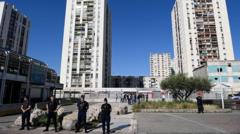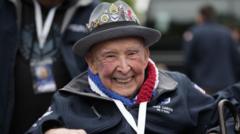**In a poignant ceremony commemorating the D-Day landings, Defense Secretary Pete Hegseth balanced respect for history with current international tensions, reflecting the complex relationship between the U.S. and its European allies.**
**Tensions Mark D-Day Commemoration as Defense Secretary Reflects on Sacrifices**

**Tensions Mark D-Day Commemoration as Defense Secretary Reflects on Sacrifices**
**Concerns Linger Among Allies Despite Honors for WWII Veterans**
Defense Secretary Pete Hegseth visited Normandy, France, on June 6, 2025, to honor the 81st anniversary of D-Day, a pivotal moment in World War II that involved the Allied liberation of France from Nazi control. This visit marked Mr. Hegseth's first return to Europe following controversial remarks about NATO allies, which had fueled anxiety about his reception.
Delivering a solemn address in front of the graves of 9,389 American soldiers, Hegseth refrained from any controversial statements, instead emphasizing the collective efforts of the Allied forces. "Without the sacrifices of American, French, British and other Allied powers, we would not have a free world," he noted, acknowledging the contributions of the French resistance among others.
Despite the comforting words provided during the ceremony, an air of tension remained palpable. Many attendees, including elderly World War II veterans, expressed relief at Hegseth’s respectful remarks. However, the underlying issues surrounding U.S. relations with Europe and perceptions of military spending and commitment persist, overshadowing the day of remembrance.
As Hegseth spoke, the historical significance of D-Day intertwined with the present-day challenges facing NATO and the importance of unity among allies, reflecting the dual legacy of remembrance and current geopolitical uncertainties.
Delivering a solemn address in front of the graves of 9,389 American soldiers, Hegseth refrained from any controversial statements, instead emphasizing the collective efforts of the Allied forces. "Without the sacrifices of American, French, British and other Allied powers, we would not have a free world," he noted, acknowledging the contributions of the French resistance among others.
Despite the comforting words provided during the ceremony, an air of tension remained palpable. Many attendees, including elderly World War II veterans, expressed relief at Hegseth’s respectful remarks. However, the underlying issues surrounding U.S. relations with Europe and perceptions of military spending and commitment persist, overshadowing the day of remembrance.
As Hegseth spoke, the historical significance of D-Day intertwined with the present-day challenges facing NATO and the importance of unity among allies, reflecting the dual legacy of remembrance and current geopolitical uncertainties.



















